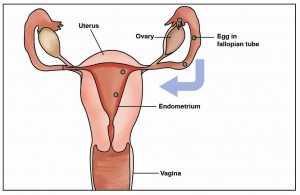
1. What is ovulation?
Ovulation is the moment when a mature egg is released from the ovary. The egg then travels down the fallopian tube. Once released, the egg will only have a life span of no more than 24 hours. If it is fertilized by a sperm, it then goes down to the womb (uterus) to be implanted. If there is no fertilization, the egg and thickened lining of the uterus will be shed as period (menses).
2. What causes ovulation?
Ovulation is caused by hormonal changes that occur in your body. Prior to ovulation, there an increased in a hormone called LH (Luteinizing Hormone) which causes the egg to separate from the ovarian surface. An
ovulation predictor test predicts the timing of your ovulation by detecting the surge of this LH. Ask your doctor about this ovulation test.
3. What is luteal phase?
The ovulation cycle is divided into 2 phase:
i) Follicular phase. The first half of the cycle starts from the first day of your menses until day of ovulation. This phase could differ for each women lasting from 7 till 40 days.
ii) Luteal phase. This is the second half of the cycle which is the day of ovulation until the next period begins. The luteal phase has a more fixed length and consistent from cycle to cycle. It is usually about 12 -16 days from the day of ovulation. On average it is about 14 days for most women.
4. What is my ‘fertile days’?
You fertile days are about 5 days before ovulation (as the sperm could survive for 5 days in the women’s body) and last 2 days after ovulation. Therefore, your fertile period i.e period of time where sexual intercourse could lead to pregnancy is around 7 days. The ‘peak fertility’ period is the day before and the day of ovulation.
[easyazon-image align=”none” asin=”B002VLYAOI” locale=”us” height=”110″ src=”http://ecx.images-amazon.com/images/I/51Rl2b5wRoL._SL110_.jpg” width=”110″] [easyazon-image align=”none” asin=”B0026995KO” locale=”us” height=”110″ src=”http://ecx.images-amazon.com/images/I/31upksKaVYL._SL110_.jpg” width=”110″] [easyazon-image align=”none” asin=”B000S2O1CI” locale=”us” height=”110″ src=”http://ecx.images-amazon.com/images/I/51g7tmOD%2BzL._SL110_.jpg” width=”110″] [easyazon-image align=”none” asin=”B0000533AY” locale=”us” height=”110″ src=”http://ecx.images-amazon.com/images/I/31Ehw1KC44L._SL110_.jpg” width=”110″]
5. Can I feel ovulation? What are the signs of ovulation?
Some women could feel pain in the lower abdomen during ovulation. This is known as Mittleschmerz pain which means “middle pain” in German. The pain could last a few seconds to as long as 1 to 2 hours. Other signs of ovulation include:
- Changes in the position and secretions from the cervix
- Light vaginal bleeding (spotting)
- Increase in sex drive
- Breast tenderness
- Abdominal bloating
- Heightened sense of vision, smell or taste
- Increased in the level of LH which could be detected by ovulation predictor test.
- Changes in your basal body temperature.
6. How do I track my ovulation?
Tracking your ovulation may require you monitoring your menstrual cycle for several months and noticing changes that occur in your body. There are 4 methods of tracking your ovulation:
- Body basal Temperature: This will require you to monitor your temperature every morning. At ovulation, your body releases the hormone called progesterone which increases your body temperature between 0.4 to 0.8 Degrees Fahrenheit. The reason for this increase in body temperature is to create a warmer, fertile environment for the fertilized egg
- Cervical Mucus: This will require you to monitor the changes that occur in your cervical secretions. Prior to ovulation your cervical mucus will increase and become clear and slippery.
- Ovulation Predictor test: This will require you to monitor the surge of the hormone LH. Usually the test detects the LH hormone in your urine.
- Calendar method.: This will require to monitor your menstrual cycle and predict ovulation.
7. What if I have irregular menstrual cycle? How do I track my ovulation?
A normal menstrual cycle usually is between 21 to 35 days. However, if your cycle is consistently less than 21 days or more than 35 days you may be considered having irregular cycle. You may need to consult your doctor regarding this.
8. Can I have a period and still have not ovulated?
Having a period does not necessarily means that ovulation takes place. This is called anovulatory cycle where no ovulation has occurred.
9. Can I ovulate right after my period?
This is possible especially if you have a 21 day cycle and your period lasts for 7 days. This is because ovulation can occur 12 – 16 days before the expected next period begins, hence you could be ovulating on day 6 – 10 of your cycle.
10. Can I ovulate without having a period?
This is possible. If you are not menstruating due to a certain condition such as low body weight or breast feeding, you risk the chance of ovulating at any point as a women releases an egg 12 -16 days before her expected period. Hence, if you do not want to get pregnant, you need to use a reliable form of contraception.
Filed under Ovulation | No Comments








